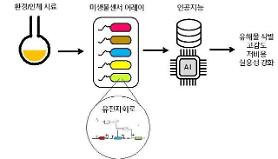
[Courtesy of the Korea Research Institute of Bioscience and Biotechnology]
SEOUL -- A COVID-19 pandemic has called for the enhanced hygiene of public facilities. The fear of infection prompted the fast adoption of antibacterial materials such as gloves. Antibacterial films and similar materials were widely used to cover elevator buttons, door handles and other objects that are frequently touched by many random people.
However, there has been no practical solution to prevent cross-infection while preserving intrinsic skin naturalness. South Korean and Japanese researchers introduced an antibacterial nanomesh patch to prevent cross-infection while preserving intrinsic skin conditions. The nanomesh is an inorganic nanostructured two-dimensional material, similar to graphene.
Prototypes developed by a joint research team are still small enough to cover fingerprints, but researchers think their technology can be applied later to masks and clothing, according to the Korea Research Institute of Bioscience and Biotechnology (KRIBB). The research team included Kwon Oh-seok at KRIBB's Infectious Disease Research Center and Takao Someya, a professor of electrical and electronic engineering at the University of Tokyo.
"We propose an antimicrobial skin protection platform copper nanomesh, which prevents cross-infection morphology, temperature change rate, and skin humidity," the researcher team said in a paper published on the website of the Proceedings of the National Academy of Sciences (PNAS), a peer-reviewed multidisciplinary scientific journal.
Skin protection against infectious pathogens requires common and long-term wear without discomfort or distortion of the skin functions. The team found that copper nanomesh composed of copper coating and interconnected polymer nanofibers can kill 99.99 percent of bacteria and viruses within one and ten minutes and prevent bacterial cross-infection.
Copper, which has already been proven to have an antibacterial effect, was applied to thin flexible polymer nanofibers which stick to the skin well by adding an adhesive polymer.
"The thin and porous nanomesh allows for conformal coating on the fingertips, without significant interference with the rate of skin temperature change and humidity. Efficient cross-infection prevention and thermal transfer of copper nanomesh were demonstrated using direct on-hand experiments," the team said.
Copyright ⓒ Aju Press All rights reserved.



